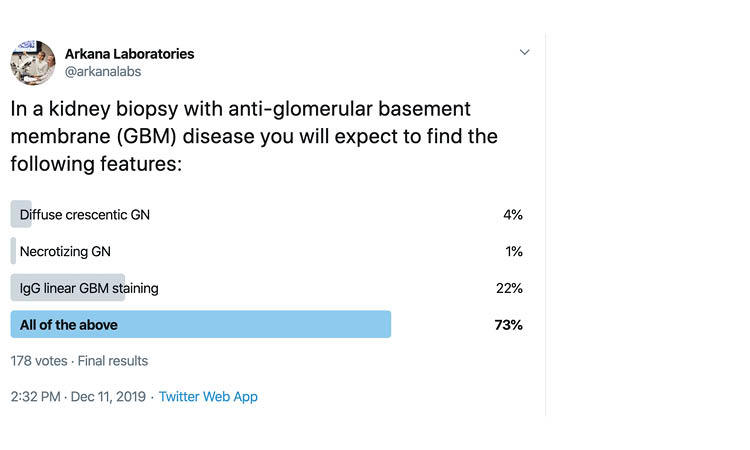Answer: D, All of the Above
Anti-GBM disease presents with rapidly progressive glomerulonephritis (GN) with or without pulmonary hemorrhage. On biopsy typical disease displays bright polytypic linear GBM staining for IgG by immunofluorescence and diffuse crescentic/necrotizing GN on light microscopy.
Anti-glomerular basement membrane (GBM) nephritis is clinically and pathologically one of the most aggressive form of glomerulonephritis. Patients typically present with nephritic syndrome and rapidly progressive acute kidney injury. Lung involvement in the form of alveolar hemorrhage occurs in 34% to 62% of patients. Anti-GBM disease is due to circulating autoantibodies directed against cryptic epitopes in the NC1 domain of the alpha-3 chain of type IV collagen (a3NC1), also known as the Goodpasture antigen.
REFERENCES:
Jennette JC. Rapidly progressive crescentic glomerulonephritis. Kidney Int. 2003;63:1164–1177.
Daly C, Conlon PJ, Medwar W, et al. Characteristics and outcome of antiglomerular basement membrane disease: a single-center experience. Renal Failure. 1996;18:105–112.
Cui Z, Zhao J, Jia XY, et al. Anti-glomerular basement membrane disease: outcomes of different therapeutic regimens in a large single center Chinese cohort study. Medicine. 2011;90:303–311.
Savage CO, Pusey CD, Bowman C, et al. Antiglomerular basement membrane antibody mediated disease in the British Isles 1980-4. Br Med J. 1986;292:301–304.
Quick note: This post is to be used for informational purposes only and does not constitute medical or health advice. Each person should consult their own doctor with respect to matters referenced. Arkana Laboratories assumes no liability for actions taken in reliance upon the information contained herein.

